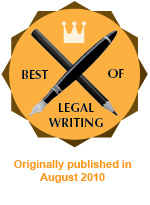 One of my chief editing tips is to read your document repeatedly, each time scanning for only one thing – excessive commas, unnecessary capitalization, throat-clearing, etc.
One of my chief editing tips is to read your document repeatedly, each time scanning for only one thing – excessive commas, unnecessary capitalization, throat-clearing, etc.
The first scan should probably be devoted to eliminating passive voice.
Passive voice: The ball was thrown by Cathy.
Active voice: Cathy threw the ball.
The first example is grammatically correct but requires more words and disturbs flow for the reader. The second example is in the past tense (“threw” not “throws”) but the active voice. A few more examples:
Passive: It was insisted by the scientist that her patent was valid.
Active: The scientist insisted that her patent was valid.
Active voice almost always provides more “punch.” As the venerable Strunk & White wrote, “[W]hen a sentence is made stronger, it usually becomes shorter. Thus, brevity is a by-product of vigor.”
Active voice can be downright essential in legal writing, when knowing the actor may be critical to accuracy.
For instance, in the following example, passive voice creates ambiguity that could require litigation to figure out exactly who is obligated to do what.
Passive: Product defects must be disclosed.
Active: Sellers must disclose product defects.
To be sure, passive voice is sometimes appropriate, especially when the actor is obvious or unimportant. For example, “The legislature passed the bill” is actually more cumbersome than “The bill was passed.” Similarly, “The subpoena was served” is better than the active-voice alternative.
You may also use passive voice strategically when you want to de-emphasize the actor – your client, perhaps.
The funds were embezzled.
But generally, make a habit of preferring active voice and using passive voice only sparingly and deliberately.To quickly spot passive voice during editing, look for “to be” verbs and sentences in which the verb precedes the actor.
From the Editor:
A huge thank you to Leslie A. Gordon, author of our long-running “Legal Writing Tips” column who retired from the column with the August 2014 issue of the BASF Bulletin. Her monthly columns started in 2008 and featured sage advice for improving writing and avoiding grammar errors. The BASF Bulletin will begin featuring “The Best of Legal Writing Tips” until a replacement contributor can be finalized.
About the author:
 A former lawyer, Leslie A. Gordon is a freelance journalist living in San Francisco. She is the author of Cheer: A Novel, which is available on Amazon. She can be reached via email at leslie.gordon@stanfordalumni.org. Follow Leslie on Twitter: @LAGordonWriter.
A former lawyer, Leslie A. Gordon is a freelance journalist living in San Francisco. She is the author of Cheer: A Novel, which is available on Amazon. She can be reached via email at leslie.gordon@stanfordalumni.org. Follow Leslie on Twitter: @LAGordonWriter.



0 comments on “Legal Writing Tip: Get Active in Your Editing; Eliminate Passive Voice”